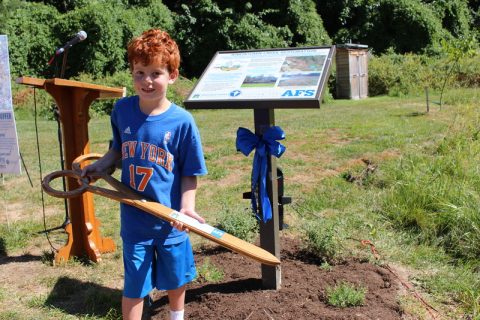Rain gardens are beautiful, for sure. Filled with native plants and grasses, they attract birds and butterflies while also filtering water that runs off pavement and roofs during a storm. Cleaner runoff means cleaner creeks, and cleaner drinking water for communities. Not to mention healthier places for wildlife and fishing.
Basically, rain gardens mimic nature’s way of dealing with heavy rains: slowing the flow and using plants as natural filters to pull out the bad stuff before the water gets into a stream, creek or river. Especially when rain gardens are planted at the headwaters of a creek, they can be a huge help for cleaner water.
 At the Abington Friends School and Monthly Meeting just outside Philadelphia, teachers and students alike are using the outdoors as a learning tool as they make their school greener and more beautiful—in part by installing rain gardens and streamside trees.
At the Abington Friends School and Monthly Meeting just outside Philadelphia, teachers and students alike are using the outdoors as a learning tool as they make their school greener and more beautiful—in part by installing rain gardens and streamside trees.
So it was great news when engineers decided to test the school’s rain gardens with local clean water community group TookanyTacony Frankford Watershed Partnership at the headwaters of Jenkintown Creek in the Philadelphia suburbs. They wanted to see just how much cleaner the water is after flowing through them. The answer: a lot.
When Villanova University researchers tested the water before and after it ran through the rain gardens, they were amazed. Some of the most damaging pollutants that make it into our streams are phosphorous and nitrogen. In excess, these pollutants cause fish kills, algae blooms and all kinds of negative impacts for people and wildlife. In addition, warm stormwater that enters the stream during summer rains can harm wildlife.
Sergio Carvajal Sanchez of Villanova found 40 percent less phosphorous and nitrogen pollution after water flowed through the rain gardens. He also found that the stream was cooler after the addition of the rain gardens. Nature is doing her job—cheaply, beautifully and effectively.
These kinds of community-based, small-scale solutions can have a huge impact on a community’s water supply and quality of life. Cooler streams with less phosphorous and nitrogen mean cleaner water and healthier communities, and having the school support these efforts has been exciting, educational and gratifying for everyone involved.
School and community leaders, together with the researchers and foundations supporting this work, are eager to share these successes in hopes they will inspire many other communities to build their own beautiful, hard-working rain gardens.
This work is part of a regional clean water initiative dubbed the Delaware River Watershed Initiative. The Delaware River Watershed Initiative is among the country’s largest non-governmental conservation efforts to protect and restore clean water—a first-of-its-kind collaboration involving 65 non-governmental organizations working together to protect and restore the Delaware River and its tributaries, which provide drinking water for 15 million people in Pennsylvania, New York, New Jersey and Delaware.